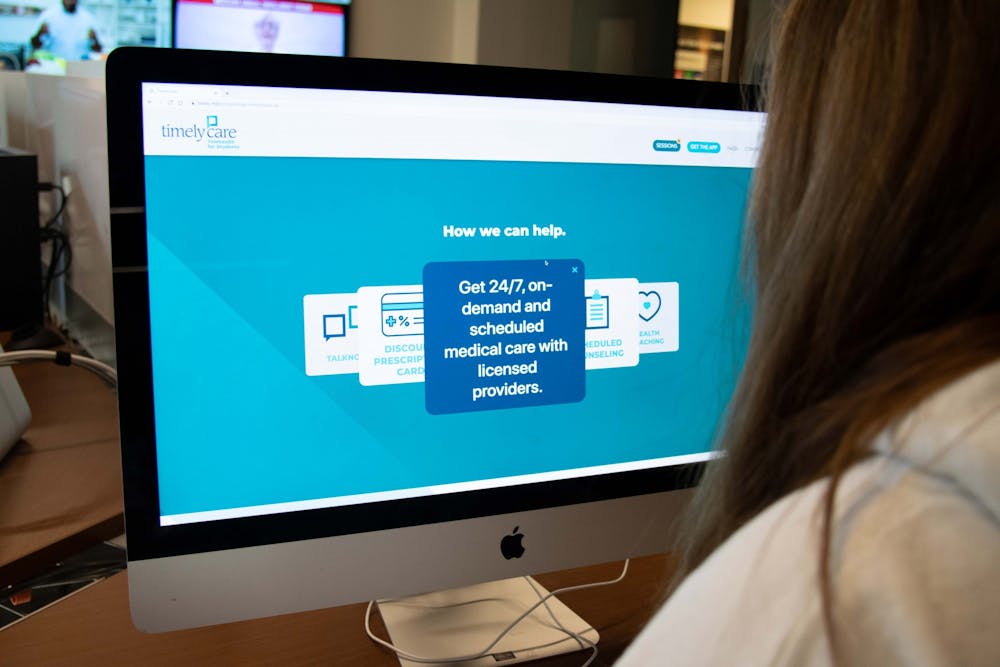Elon University announced it will extend and expand its partnership with TimelyCare, the virtual telehealth portal that provides students with free 24-hour access to medical and mental health hotlines, into the 2022-23 academic year on Aug. 11.
The services were originally launched on campus October 2021 and will now include 24/7 on-demand or scheduled access to a medical provider as well as TalkNow, 24/7, on-demand access to a mental health professional.
The service will remain available in addition to the existing in-person services at Counseling Services and Student Health Services and will continue to have no user fees, according to the email.
Elon News Network sat down with Dean of Students Jana Lynn Patterson to discuss the continuation of these services and what this resource provides for Elon students.
This interview has been edited for clarity.
What played into the decision to expand and extend TimelyCare services, how long has this been in the works?
“It gives us an opportunity to provide students with options beyond what we may be able to offer in Student Health and Counseling services. These are not replacements for our in person care, but they are certainly opportunities if students want to engage with someone outside of those services. There are some more specialities, they offer a broader range of specialities, especially in mental health care.
It provides a greater range of services and also with students schedules, if a student would like an evening or weekend appointment, especially, they can get that. Or if we have a medical situation or norovirus or Federal Completion or something and our demand exceeds our ability to pivot in Student Health Services and it gives students access to 24/7 medical care as well. Instead of a student having to go to an urgent care or the emergency department and wait two, three, four, five, seven hours and pay a hefty copay, these are all free.”
What type of feedback did you receive from students? Will you be accepting feedback once the expansion is implemented?
“Another area of interest for timely care came from some of our student leadership. We asked them, ‘What companies should we pursue?’ And it was overwhelmingly positive. We did what we call a request for proposals in many companies and really found that TimelyCare offers the highest level of service and most comprehensive service.
This allowed us to have another avenue to kind of absorb some of that shock when you have providers out so that it provided less of a disruption.
A little over 1000 students registered on the system last year and used the system. The feedback was overwhelmingly positive, extremely high. They saw about 837 visits that were medical visits, many of them in the evening, weekend and they originated from 13 different states, most of them from North Carolina, but we had students who were at home for breaks, students that were studying in L.A., students that were doing internships in New York, students that were on spring break in Florida. So, lots of places students originated care from. Most of them were from right here on campus, but that’s the other beauty, this service is available to students 24/7 from anywhere in the United States.
How much does it cost the university? It is itemized in student tuition bills, one big fee?
“It comes from a combination of our tuition and our Student Health fees, the cost, the final cost is not something we would want to disclose because I think it sends the wrong message to put a cost on it. It’s an investment, a hefty investment, but it’s an investment on our students and their well-being.”
There are conversations about telehealth services being a barrier for drug misuse, is this a concern at Elon?
“It’s not going to be an issue with TimleyCare because TimelyCare can’t prescribe controlled substances, so things that would be most likely to be abused, they would recommend they seek in person care.”
How does this play into the plan to build an integrated student wellness center in the center of campus?
“I hope that TimelyCare again provides an opportunity for students really to manage on a broad spectrum of services in a way for many students fits their lifestyle, fits their needs.
I think they will continue to be part of that integrated care, but their virtual we will continue the plan is to continue they will not replace on campus health or mental health services counseling services on campus. We see them as continuing to be good partners but never a substitute for that.
The decision about building something central really came from students’ feedback over the last few years. I mean that’s really the senior staff working with students and recent alum about the need to bring some of the wellness and well-being concepts closer to the core of campus and more visible to the core of campus.
We originally looked at renovating Koury. When you go to renovate a building and think I'm going to retrofit it for this, this, this and this, it really became clear that building a new facility that would house those integrated health and wellness areas would be just a better move. We made the decision that that's the direction we were most likely to go with. Who knows, you know, things could change but I don't expect them to.
Health services will probably stay where they are in Ellington Center. We share facility with faculty, staff wellness and well being.
But by counseling moving closer to the core of campus, it does give us the ability to think about expansion in some of those health services both for students but also for faculty and staff. It gives some opportunity to change the footprint on the interior of that building, but that's going to be several years down the road.”


